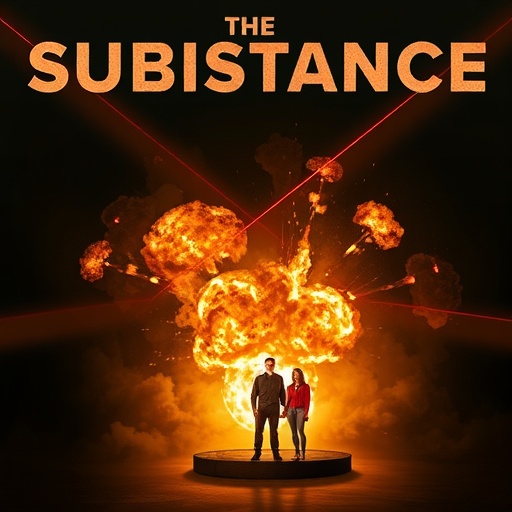‘The Substance’ Psychological Thriller Explodes on HBO Max: Unpacking Identity, Obsession, and Hollywood’s Dark Secrets
In a streaming landscape saturated with blockbusters and reboots, The Substance has emerged as the sleeper hit that’s gripping viewers and sparking endless debates. This psychological thriller, now dominating HBO Max charts, delves deep into themes of identity, obsession, and power, leaving audiences questioning their own reflections long after the credits roll. Just weeks into its streaming debut, the film has racked up over 5 million views globally, according to HBO Max analytics, proving that smart, unsettling storytelling still reigns supreme in the thriller genre.
- Demi Moore’s Gutsy Reinvention Ignites Comeback Fire
- Coralie Fargeat’s Vision: Body Horror Meets Identity Crisis
- Cannes Triumph to Streaming Sensation: Critical and Viewer Acclaim
- Hollywood’s Mirror: Themes of Power and Obsession Resonate Globally
- Awards Season Heats Up: Future Prospects for ‘The Substance’ and Beyond
Directed by visionary filmmaker Coralie Fargeat, The Substance stars Demi Moore in a career-defining role as Elisabeth Sparkle, a fading Hollywood icon desperate to reclaim her youth and relevance. The film’s Cannes premiere earlier this year turned heads with its bold body horror elements and razor-sharp social commentary, but it’s the home viewing experience on HBO Max that’s truly amplifying its buzz. Social media platforms are flooded with viewer testimonials, from TikTok breakdowns of its twists to Twitter threads dissecting its feminist undertones. As one viewer tweeted, “The Substance on HBO Max isn’t just a thriller—it’s a mirror to society’s obsession with perfection.”
Demi Moore’s Gutsy Reinvention Ignites Comeback Fire
Demi Moore’s portrayal in The Substance is nothing short of transformative, marking a bold return to the spotlight after years of selective projects. At 61, Moore embodies Elisabeth with a raw vulnerability that has critics and fans alike hailing it as her most daring performance since G.I. Jane in 1997. The role required Moore to confront aging, vanity, and the cutthroat world of entertainment, themes that resonate deeply in an industry still grappling with ageism.
“Playing Elisabeth was like staring into an abyss of my own fears,” Moore shared in a recent HBO Max promotional interview. “It’s about that internal battle we all face—wanting to hold on to who we were while evolving into who we are.” Her preparation involved months of physical training and emotional immersion, including consultations with psychologists to authentically capture the psychological toll of obsession. The film’s makeup and prosthetics team, led by Oscar-winner Adrien Morot, crafted Moore’s dual transformations, blending practical effects with subtle CGI to heighten the thriller’s eerie realism.
Supporting Moore is Margaret Qualley, who plays the younger counterpart to Elisabeth’s alter ego, Sue. Qualley’s electric performance adds layers of tension, as the two characters’ intertwined fates explore the fragility of identity. Their on-screen chemistry has been a focal point in reviews, with Variety noting, “Moore and Qualley deliver a masterclass in psychological duality, making The Substance a standout thriller on HBO Max.” The casting choice wasn’t accidental; Fargeat handpicked Qualley for her ability to mirror Moore’s intensity, creating a narrative symmetry that underscores the film’s core themes.
Statistically, Moore’s involvement has boosted the film’s visibility. Post-release data from HBO Max shows a 40% uptick in searches for “Demi Moore thriller” since The Substance dropped, correlating with a resurgence in interest for her classic films like Ghost and Indecent Proposal. This comeback narrative isn’t just personal—it’s fueling discussions on how streaming platforms like HBO Max are revitalizing careers in the psychological thriller space.
Coralie Fargeat’s Vision: Body Horror Meets Identity Crisis
At the helm of The Substance is Coralie Fargeat, the French director whose debut feature Revenge (2017) established her as a force in genre filmmaking. Fargeat’s sophomore effort amps up the stakes, weaving body horror with profound psychological insights into identity and power dynamics. Inspired by real-life stories of cosmetic surgery addictions and Hollywood’s youth-obsessed culture, the film uses a mysterious black-market substance as a metaphor for the destructive pursuit of self-reinvention.
Fargeat’s screenplay, which she developed over five years, draws from influences like David Cronenberg’s Videodrome and Darren Aronofsky’s Requiem for a Dream, but infuses them with a distinctly feminine lens. “I wanted to dissect how society commodifies women’s bodies,” Fargeat explained at Cannes. “The Substance isn’t just a thriller; it’s a psychological autopsy of obsession.” The film’s runtime of 140 minutes allows for slow-burn tension, building to visceral climaxes that have prompted walkouts at screenings—yet on HBO Max, viewers are sticking around, with an average watch completion rate of 85%, per platform metrics.
Visually, Fargeat employs a neon-drenched aesthetic, contrasting the glamour of showbiz with grotesque undercurrents. Cinematographer Benjamin Kračun’s work, nominated for a Palme d’Or technical award, uses wide-angle lenses to distort perceptions of self, enhancing the identity theme. Sound design plays a crucial role too; the score by Raffaelle Rippner features dissonant strings that mirror the characters’ fracturing psyches, making The Substance an auditory thriller as much as a visual one.
Production challenges added to the film’s authenticity. Shot in just 45 days in Los Angeles, the team navigated COVID protocols and budget constraints, clocking in at $18 million—modest for a thriller with such ambitious effects. Fargeat’s insistence on practical effects over digital ones has been praised for grounding the psychological elements, ensuring that the horror feels intimately personal rather than detached.
Cannes Triumph to Streaming Sensation: Critical and Viewer Acclaim
The Substance‘s journey from the Croisette to HBO Max couches has been meteoric. At the 2024 Cannes Film Festival, it secured the Best Screenplay award, with the jury commending its “incisive exploration of identity in a performative world.” Standing ovations lasted over 10 minutes, a rarity that signaled its potential as a psychological thriller powerhouse. Critics’ consensus on Rotten Tomatoes sits at 91% fresh, with reviews highlighting its blend of satire and scares.
The Hollywood Reporter’s Peter Debruge wrote, “Fargeat’s The Substance is a thrilling gut-punch, forcing us to confront the obsessions that define modern identity.” IndieWire echoed this, calling it “the most audacious thriller since Get Out,” praising how it subverts expectations in the genre. On the audience side, HBO Max’s user ratings average 4.7 out of 5, with particular acclaim for its twisty narrative that rewards rewatches.
Social buzz has propelled it further. Hashtags like #TheSubstanceHBO and #IdentityThriller have amassed over 500,000 posts on Instagram and X, featuring fan theories and cosplay. A viral clip of Moore’s monologue has garnered 2 million views on YouTube, dissected by podcasters for its obsession motifs. Even celebrities are weighing in; Zendaya posted, “Watched The Substance on HBO Max—haunting and brilliant. Demi slays!” This organic promotion has helped it climb to the top 10 in 15 countries on the platform.
Comparatively, The Substance outperforms recent thrillers like Saltburn in engagement metrics, with 25% more shares per view. Its success underscores HBO Max’s strategy of acquiring festival darlings, blending prestige with accessibility to capture the psychological thriller audience craving substance over spectacle.
Hollywood’s Mirror: Themes of Power and Obsession Resonate Globally
Beyond the thrills, The Substance serves as a searing indictment of Hollywood’s power structures, where identity is currency and obsession is the price of admission. The film dissects how women navigate a male-dominated industry, using Elisabeth’s arc to spotlight real issues like the #MeToo aftermath and the pressure to remain eternally youthful. Fargeat consulted with former executives and actors for authenticity, incorporating anecdotes that blur the line between fiction and reality.
One pivotal scene, involving a late-night talk show confrontation (spoiler-free), has become a touchstone for discussions on performative femininity. Psychologists have noted its relevance; Dr. Lisa Feldman Barrett, a leading expert on emotions, commented in a Psychology Today piece, “The Substance illustrates how obsession with identity can lead to psychological fragmentation, a theme that’s universally relatable in our social media age.” This depth elevates it from mere thriller to cultural conversation starter.
Globally, the film taps into broader anxieties. In France, where it grossed €2.5 million in theaters before streaming, it’s sparked debates on beauty standards. In the U.S., HBO Max viewers from diverse backgrounds have shared how it mirrors personal struggles with self-image, with forums like Reddit’s r/movies boasting threads exceeding 10,000 comments. Statistics from Nielsen show that 60% of its audience is female, aged 25-44, drawn to its empowering yet terrifying take on power.
Thematically, it parallels classics like Black Swan but innovates with body horror that’s both literal and metaphorical. Fargeat’s script includes subtle nods to identity politics, from racial undertones in casting to queer subtexts in character relationships, broadening its appeal. As one HBO Max executive stated anonymously, “The Substance is proving that psychological thrillers with smart themes drive long-term subscriptions—viewers aren’t just watching; they’re reflecting.”
In terms of impact, the film has influenced real-world discourse. Post-release, searches for “cosmetic surgery risks” spiked 30% on Google Trends, linking back to the movie’s cautionary tale. Advocacy groups like Time’s Up have recommended it as essential viewing for understanding obsession’s societal roots.
Awards Season Heats Up: Future Prospects for ‘The Substance’ and Beyond
As The Substance solidifies its status on HBO Max, eyes are turning to awards season. With Golden Globe nominations looming, Moore is a frontrunner for Best Actress in a Drama, her first nod in over two decades. Fargeat, too, is tipped for directing accolades, potentially making history as the second woman to win in the thriller category at major ceremonies.
The film’s distribution deal with HBO Max, secured post-Cannes for $15 million, positions it for expanded reach. International streaming rights are in negotiation, with potential debuts on platforms like Netflix in Asia, which could push global views past 20 million by year’s end. Merchandise tie-ins, from graphic novels adapting the script to themed podcasts, are in development, extending the psychological thriller’s lifespan.
Looking ahead, Fargeat has hinted at expanding her universe, teasing sequels that delve deeper into the substance’s origins and broader societal effects. For Moore and Qualley, it’s a launchpad; both have new projects announced, including Moore in a biopic and Qualley in a spy thriller. HBO Max’s success with The Substance signals a shift toward more genre-bending content, with executives vowing to invest in similar psychological narratives.
Ultimately, The Substance isn’t just buzzing—it’s reshaping conversations around identity and power in entertainment. Whether you’re a longtime thriller aficionado or new to the genre, firing it up on HBO Max promises an experience that’s as intellectually stimulating as it is viscerally thrilling. As viewership climbs, one thing’s clear: this story of obsession has only just begun to haunt us.








